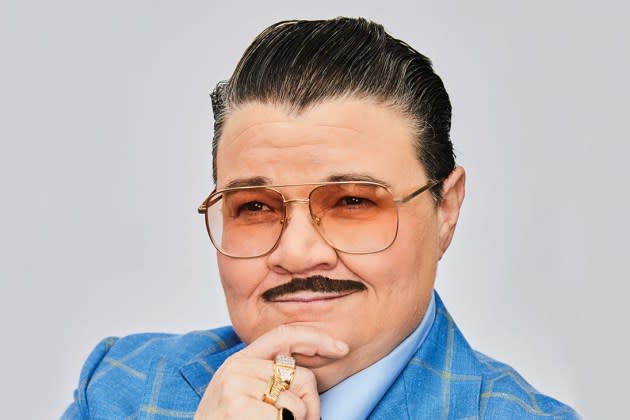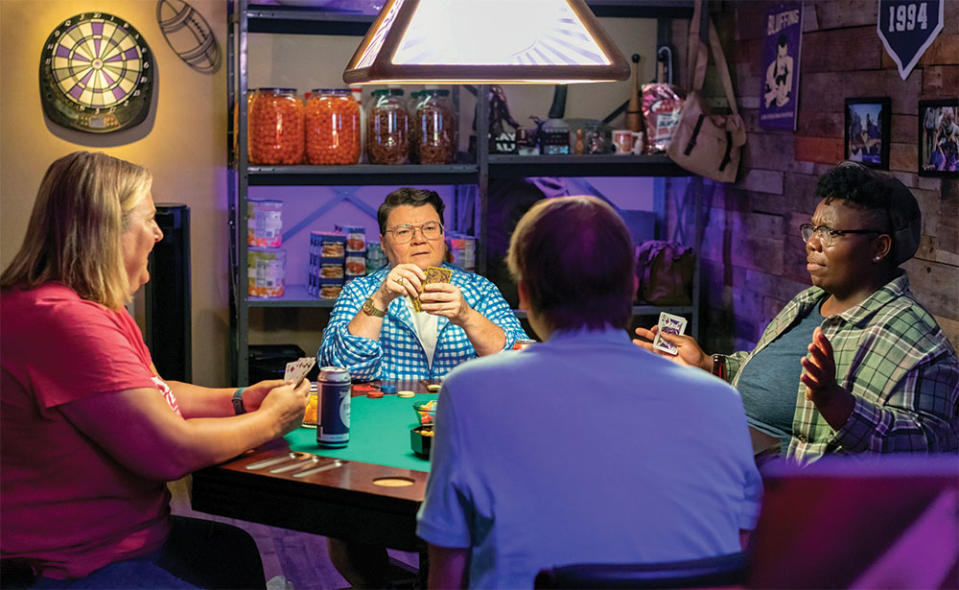Person of Interest: ‘Somebody Somewhere’ Star Murray Hill on Finding Chosen Family On and Off the Show

“Showbiz!” is not only actor and nightlife legend Murray Hill’s signature catchphrase — it’s a perfect descriptor of the besuited Somebody Somewhere star’s Old Hollywood charm.
Hill has been a cabaret host and Lower East Side fixture since arriving in New York City more than 20 years ago. It was at a lesbian dive called Hershey Bar that Hill was first exposed to drag kings (women impersonating men). “It was all about masculinity and passing, very heavy and dark,” says Hill. “It wasn’t camp or comedy like the drag queens I’d seen. It wasn’t euphoric.” Detecting an untapped market, Murray Hill was born, the name adopted from Hill’s actual East Side neighborhood at the time.
More from The Hollywood Reporter
Tupac, Biggie and Jay-Z's Emmy Nods: "You Never Thought Hip-Hop Would Take It This Far"
2023 VMAs: Taylor Swift Wins, 'N Sync Reunites and Shakira Slays
VMAs: Taylor Swift Makes History Winning Video of the Year Two Years in a Row
Anyone who’s seen Hill onscreen or onstage — or simply sat down for a cocktail with him — is sure to notice the positivity emanating from him in waves. “Camp humor — I’ve always been attracted to it. I like to disarm and connect with people with my heart. I want to find the commonality,” Hill explains through chuckles and sips of Coke. “I’m visible. I’m out there, I’m not a threatening person. I’m like Uncle Murray at Thanksgiving.”
As a trans man, Hill didn’t grow up seeing himself represented in movies or TV. He comes from a conservative upbringing in a suburban New England town and so, like many queer people, found his family through the community he built himself — a theme reflected in the Bridget Everett-led dramedy Somebody Somewhere, which focuses on a woman finding refuge in a small-town queer community. “When I got to New York, the queer community was a dustbuster,” says Hill. “And I was just sitting there, waiting to get sucked in.”

He met Everett through a mutual friend more than two decades ago. “I was walking in Brooklyn, and a friend of mine was walking with this very tall, big-boned woman,” Hill recalls. “And he’s like, ‘This is my friend. She just moved into town. She’s a singer.’ I took one look at her and said, ‘All right, come to my show Saturday night. You’re on.’ She did a number [in] a corset and panties. My audience went ballistic for her. We both had cheekbones — that’s how long ago it was.”
On the show, Hill plays the warmhearted Fred, who is based directly on him. “I’m the only person that didn’t have to audition,” he muses. “And thank God, because if I did, I wouldn’t have gotten the job to play myself.”
Fred is a rare example of a trans man being portrayed on camera without fanfare about his gender. “I wanted Fred to be treated and portrayed like everybody else,” Hill explains. “I didn’t want Fred to be a ‘trans character’ having a ‘trans wedding.’ I wanted him to have the same expression of love that [the] other characters have.”
Finally working side by side onscreen after decades of rejection has proved emotional for Hill and Everett. “It was always a goal to get a show that would take the smallest downtown audience and aesthetic and message and do it on a bigger scale,” Hill recalls. “[Bridget] called me up and she said, ‘Murray, they greenlit the pilot,’ and I started crying and she started crying. Bridget and I are both in our 50s. We’ve been at this for 20-plus years. And both Bridget and I, we never changed who we are.”
This story first appeared in a June stand-alone issue of The Hollywood Reporter magazine. To receive the magazine, click here to subscribe.
Best of The Hollywood Reporter

